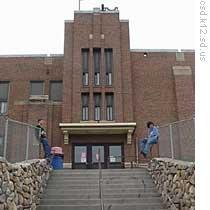-
(单词翻译:双击或拖选)
But longer days are not always a good move. Second of two reports on the effects of high fuel prices on American education. Transcript1 of radio broadcast:
24 July 2008
This is the VOA Special English Education Report.
As we said last week, American schools are looking for ways to save money on bus transportation because of high fuel prices. More children may have to walk, ride their bikes or find other ways to get to school.
But, as another effect of the high prices, they may not have to go to school as often.
Some schools, especially in rural2 areas, are changing to a four-day week. That means longer days instead of the traditional Monday through Friday schedule.
Beginning in the fall, students in the Maccray school district in Minnesota will be in school Tuesday through Friday. Each school day will be sixty-five minutes longer.
Superintendent3 Greg Schmidt says the district expects to save about sixty-five thousand dollars a year in transportation costs. The district has about seven hundred students living in an area of nine hundred square kilometers.
State officials have approved the plan for three years. They may change their mind before then if learning4 suffers.
 |
| Custer Middle School in Custer, South Dakota. The local public schools have classes four days a week. |
In Custer, South Dakota, students have been going to school Monday through Thursday since nineteen ninety-five. Superintendent Tim Creal says the change has saved an estimated5 one million dollars over just the past eight years.
But he sees other benefits, too. Students get more instructional time. And activities that used to interfere6 with classes are now held on non-school days.
He says that in the future, the growth of online classes could make it possible to require even fewer days in school. High fuel prices are driving college students to take more online classes. And in some states, high school students can take them, too.
A four-day school week sounds like a great idea for students and teachers. But working parents may have to pay for child care for that fifth day. In agricultural areas, though, it can mean an extra day of helping7 on the family ranch8.
In New Mexico, the first school district changed to a four-day week in nineteen seventy-four because of the Arab oil boycott9. Now, seventeen out of eighty-nine districts use it.
The Lake Arthur School District has just one hundred sixty students. Lake Arthur used a four-day schedule for twelve years. But a few years ago it went back to five days.
Michael Grossman heads the district. He says two studies there failed to show any real educational improvement10 using the four-day week. And he says not much instruction was taking place during the last hour of school, because teachers and students were too tired.
And that's the VOA Special English Education Report, written by Nancy Steinbach. I'm Steve Ember.
 收听单词发音
收听单词发音
1
transcript

|
|
| n.抄本,誊本,副本,肄业证书 | |
参考例句: |
|
|
|
2
rural

|
|
| adj.乡下的,田园的,乡村风味的 | |
参考例句: |
|
|
|
3
superintendent

|
|
| n.监督人,主管,总监;(英国)警务长 | |
参考例句: |
|
|
|
4
learning

|
|
| n.学问,学识,学习;动词learn的现在分词 | |
参考例句: |
|
|
|
5
estimated

|
|
| adj.根据估计的 | |
参考例句: |
|
|
|
6
interfere

|
|
| v.(in)干涉,干预;(with)妨碍,打扰 | |
参考例句: |
|
|
|
7
helping

|
|
| n.食物的一份&adj.帮助人的,辅助的 | |
参考例句: |
|
|
|
8
ranch

|
|
| n.大牧场,大农场 | |
参考例句: |
|
|
|
9
boycott

|
|
| n./v.(联合)抵制,拒绝参与 | |
参考例句: |
|
|
|
10
improvement

|
|
| n.改进,增进;改进之处,改善的地方 | |
参考例句: |
|
|
|















